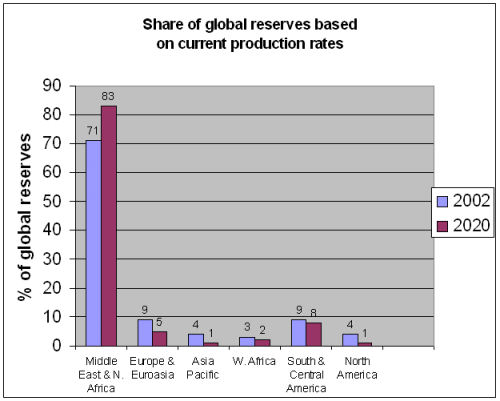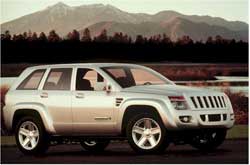I don't have a dog in the fight, I just want to know what is the best solution for us. What are the basics?
1. Oil is a finite resource that is being used at an escalating rate, so you don't have to be an expert to realize it IS going to run out some day. That day may be after I'm dead, it may be sooner....but it WILL come.
It is prudent to consider what energy source will be used post-petroleum. This seems like a great place for environmentalists and security hawks to join forces.
2. There appears to be argument about how much oil is undeveloped in various countries...but the clear fact is that the overwhelming current supply and known reserves are located in the Middle East. Billions of dollars (and other currencies) flow to the self-stated enemies of our country every day.
It is prudent to consider what energy sources can be exploited now to reduce/eliminate the aggrandizement of our enemies.
3. The overwhelming percentage of oil consumption in the US is transportation related. Turning down your thermostat is good stewardship and wise personal economics, but doesn't have much effect on our oil imports.
It is prudent to focus what is going to make a big difference for the economy and security--not fritter our time away with sexy, irrelevant gimmics. Diversifying our sources probably isn't workable, increasing efficiency won't solve only delay.
4. Non-petroleum energy sources are available or under consideration. What are the limitations? Why don't we have them in production right now?
Are 'big oil' companies holding back research into alternative fuels to maximize their petro investment?
Are alternative fuels just less efficient that gasoline?
Are they grossly more expensive?
Do we need a whole change in infrastructure?
Sidebar: I read Undaunted Courage by Steven Ambrose a couple of years ago. A tremendous book, and even more interesting to me when the story brought them to Idaho and Washington where I grew up. I have been to and lived near the places they traveled and was struck by the contrast of a primitive, wild frontier in 1803 with the high-tech dam-strewn irrigated flyover country it now is. In only 200 short years we have come from paddling a canoe down the Columbia River at 6 mph to driving a thirty thousand dollar SUV with cell phone and TV down I-90 at 80 mph. Two Hundred years! Do you think we had a bit of infrastructure to build before we could drive that SUV? Of course. Can we do it again? You bet!
How do we best go about this? The engine of rapid development and innovation is entrepreneurship driven by the promise of profit. We need to allow innovators to make money finding answers.
---------------------------------------------------------------------------------------------------------------------------------------------------------------------
Here is some information I copied from IAGS . This site warrants a close read. I can't verify the numbers but I see no reason to deny the general point.
Based on projection of 2002 production levels, BP Statistical Review of World Energy
Projecting 2001 production levels, by 2020 83% of global oil reserves will be controlled by Middle Eastern regimes.
The energy security and national security concerns that stem from reliance on a single energy resource that is unevenly distributed throughout the world will be intensified as demand for oil grows. The result will probably be:Such an international system is not sustainable.
- A handful of Middle East suppliers will regain the influence they had in the 1970s and once again be able to dictate the terms on world oil markets and manipulate oil prices and world politics.
- Middle Eastern producers will continue to use their oil revenues to increase their military expenditures, fuel an arms race and undermine regional stability.
- Corrupt, oppressive regimes will continue to use oil revenues as a means to maintain their power.
- Wealth generated by oil rich Middle Eastern countries will continue to flow into terrorist organizations and organizations promoting radical Islam.
- The U.S. will need to keep increasing American military presence in the region to ensure our access to the remaining oil. This will mean further U.S. embroilment in Middle East conflicts, more anti-American sentiment, and a deepening rift between the West and the Islamic world.
- Tension between the U.S. and China due to growing Chinese intervention in the Middle East to ensure its own access to oil and Chinese arming of Middle Eastern countries hostile to the U.S. and its allies.
- Further drain on economic resources caused by imports of expensive oil.
It is in our best interest to preemptively embark on a revolutionary change that will lead us away from oil dependency rather than drag our feet and suffer the ramifications of becoming growingly dependent on a diminishing resource.
....at another point in the website they discuss Fuel Cells burning methanol:
Fuel cell vehicles are not a pipe dream: Auto companies have already stepped up to the plate, designed, and road tested a variety of models. Mass produced, a fuel cell power system would cost about the same as today's internal combustion engine.Fuel cells can be powered by hydrogen, either in its pure form or else packaged as ethanol or methanol. A vehicle using methanol as a hydrogen carrier fuel, can be built with either a hydrogen fuel cell coupled with a reformer (either at the fueling station or on-board the vehicle,) which converts methanol to hydrogen during usage, or with a direct methanol fuel cell (DMFC.)
The methanol powered Jeep Commander 2 by Daimler Chrysler. It's a fuel cell vehicle.
The biggest advantage of using methanol as the hydrogen carrying fuel of choice for the automotive industry is that logistically, methanol, a liquid with physical characteristics very similar to gasoline, can be transported and distributed using the existing distribution infrastructure, existing gasoline stations and pumps, and on top of this can be stored on board a vehicle in a fuel tank similar to existing gas tanks. This means that from the fueling logistics standpoint, transition could be almost immediate. While building a pure hydrogen fueling station costs about $1 million, fitting an existing gas station to supply hydrogen in a methanol formulation costs about $60,000.
I see that Honda has come out with a fuel-cell vehicle, and they're making 1000 of them. While the efficiency of FEVs are yet low, keep your fingers crossed.




No comments:
Post a Comment